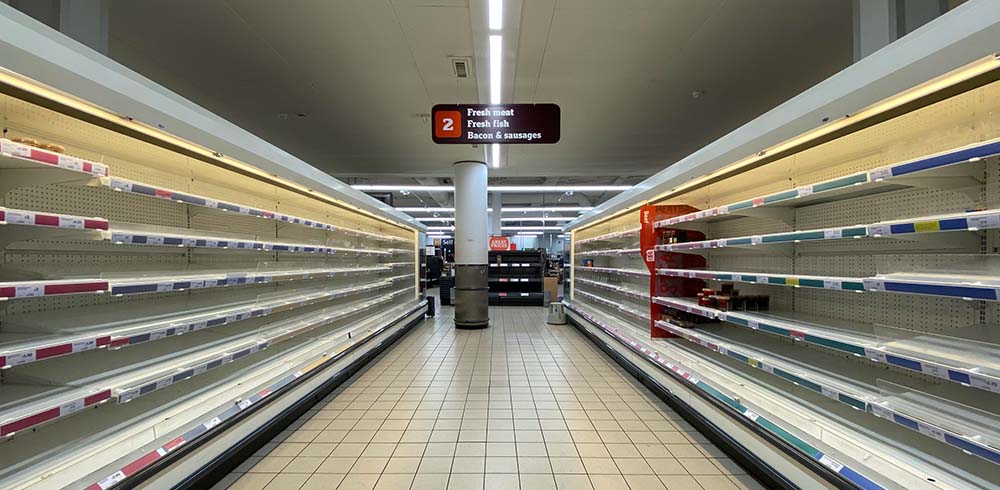Immigrant Workers in Low-Wage Frontline Jobs Need COVID-19 Workplace Protections Now
THE TORCH: CONTENTSBy Holly Straut-Eppsteiner
APRIL 10, 2020
Across the United States, workers doing essential jobs continue reporting to them, keeping grocery shelves stocked and stores sanitized, laboring at construction sites, preparing and delivering packages to our doors, collecting trash and keeping communities clean, and harvesting and processing the food that keeps our supply chains running and our refrigerators stocked. Approximately six million essential workers are immigrants. Yet these workers, who are so integral to our collective health and survival during this unprecedented COVID-19 public health crisis, have been left without meaningful protections for their own health and safety on the job.
Retailers offer workers a patchwork of protections, with some offering masks and gloves, but some employers provide no protection for workers who are face-to-face with hundreds of customers each day. At least four people who worked at grocery stores already have died from COVID-19. Sanitation workers are picking up more trash than ever without masks. Construction workers have described an inability to wash their hands at work, working in cramped conditions, having to share tools, and lacking masks or gloves.
Photo by John Cameron on Unsplash
Many farmworkers have not received additional protective gear or handwashing stations to protect themselves, have not received adequate information about the virus, and find it difficult to effectively distance themselves from coworkers while in the fields and in crowded housing. At meat and poultry processing plants, workers who labor shoulder-to-shoulder in frigid conditions have continued reporting to work when ill, to avoid receiving disciplinary points for calling in sick. Meat and poultry workers at plants across the South and West have contracted COVID-19, and four have died. Immigrants, women, and people of color disproportionately fill many of these low-wage jobs and find themselves at heightened risk of exposure to COVID-19 while at work.
Undocumented workers and their families are particularly vulnerable because they are unable to access safety-net programs that provide essential health care coverage and nutrition assistance. When employers lay off workers because of COVID-19, those who lack work authorization are ineligible for unemployment insurance even when they’ve paid taxes and their employers have paid into their state’s unemployment insurance system. Despite being taxpayers and filing tax returns, these workers will not receive stimulus payments.
From a health and safety perspective, undocumented workers face high rates of exposure to occupational hazards, but they do not receive higher pay to compensate for that risk relative to other workers. Moreover, their legal precariousness makes undocumented workers hesitant either to file claims when their rights as workers are violated or to demand protections.
The federal Occupational Safety and Health (OSH) Act gives all workers the right to safe and healthful working conditions. Employers have a duty to ensure that workplaces are free of known hazards that could harm their employees. Yet while the Occupational Health and Safety Administration (OSHA) and the Centers for Disease Control and Prevention (CDC) have offered employers guidance on COVID-19, no enforceable legal standard or regulation is in place to require employers to take certain minimum steps to protect workers who are on the frontlines of this crisis and risking their health and safety every day. Now more than ever we need policymakers to guarantee that policy responses are inclusive of all our community members — including immigrants.
In the absence of employers or government taking the necessary steps to ensure the safety and health of frontline workers at their jobs, workers have begun to take action on their own. At poultry plants in Virginia and Georgia, workers walked off the job because they fear being exposed to COVID-19 in unsanitary and unsafe working conditions and lack personal protective equipment. In Pittsburgh, sanitation workers went on a wildcat strike to protest lack of protective equipment and to demand hazard pay. Bus drivers planned a strike in Birmingham, Alabama, and a sickout in Detroit.
McDonald’s employees in San Jose, Calif., walked out because “they didn’t even have enough soap to clean their hands.” Whole Foods workers across the country held a sickout demanding paid leave and hazard pay. One thousand meatpacking workers in Colorado walked off the job after ten workers tested positive for COVID-19. These responses reveal the power workers — including immigrants — have when they act together to demand better and safer workplaces.
These bold actions demonstrate the need for the government to act now to protect the people who make up our essential workforce. The federal response to COVID-19 should include reforms that recognize immigrants’ contributions during an unprecedented crisis. All workers deserve to be treated with dignity and have safe and sanitary working conditions so they can go to work each day without fear of risking their lives. Workers have an urgent need for an OSHA standard that provides a legal safeguard requiring employers to take critical steps that will keep workers and their families safe as they keep the country running.
More information about workers’ rights related to COVID-19, including how workers can take action to protect themselves, can be found in “FAQ: Immigrant Workers’ Rights and COVID-19,” published by the National Immigration Law Center, the National Employment Law Project, and the OSH Law Project.
Holly Straut-Eppsteiner is NILC’s Mellon/ACLS Public Fellow and research program manager.






